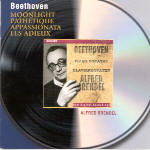To represent Alfred Brendel’s Beethoven, Philips selected these four “name” sonatas from the pianist’s digitally recorded cycle from the 1990s, as opposed to his 1970s analog edition. In general, the newer recordings boast superior engineering, but does Brendel improve as well? The digital “Pathetique” benefits from greater dynamic inflection and flexibility in the first two movements, but I prefer the lighter-gaited, less fussy analog counterpart’s Rondo. Brendel imbues the “Moonlight” sonata’s famous Adagio with more rhetorical wiggle room and shapely bass lines in the remake (the more reserved deliberation of the earlier version reminds of Rudolf Serkin and Solomon’s similar conceptions). While the digital Allegretto is sharper, more pointed, and lighter in being, I lean toward Brendel’s earlier, more nimble and less clangy finale.
No hedging over the “Appassionata”: the digital remake recaptures the sudden dynamic surges, biting accents, angularity, and daring of Brendel’s 1960s Vox recording. These qualities are absent from the pianist’s primly correct 1971 traversal. And “Les Adieux” also fares better in its digital incarnation: the sonority is warmer, less pingy than before, Brendel’s left hand speaks with more detailed assertion in the outer movements, and there’s more fluidity and nervous energy in the slow movement. As a result, though, the sudden burst of virtuosity that announces the Finale fails to surprise. On the other hand, Brendel’s earlier, more subdued slow movement bears no hint of things to come. So there you have it: Brendel’s Beethoven versus Brendel’s Beethoven. If you’re seeking more bang for your buck (and bang seems to be the operative word at times during these performances!), you can get Brendel’s analog versions of these same sonatas, along with the Tempest, Waldstein, and Pastorale in a Philips Duo for just a few dollars more than the present release. The decision is yours.
































